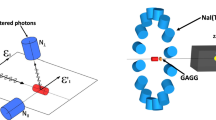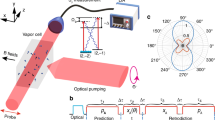Abstract
IT is well known that when positrons are annihilated, -rays with quantum energy of about 500 ekv. are emitted. This seems to prove that annihilation occurs with a loosely bound electron as a partner of the disappearing positron, the process involving mainly low energy positrons. Klemperer, using a coincidence method, was able to show that the annihilation is really accompanied by the simultaneous emission of two quanta. Our experiments were designed to test whether these two quanta are really emitted in opposite directions.
This is a preview of subscription content, access via your institution
Access options
Subscribe to this journal
Receive 51 print issues and online access
$199.00 per year
only $3.90 per issue
Buy this article
- Purchase on Springer Link
- Instant access to full article PDF
Prices may be subject to local taxes which are calculated during checkout
Similar content being viewed by others
Author information
Authors and Affiliations
Rights and permissions
About this article
Cite this article
ALICHANIAN, A., ALICHANOW, A. & ARZIMOVITCH, L. Conservation of Momentum in the Process of Positron Annihilation. Nature 137, 703–704 (1936). https://doi.org/10.1038/137703b0
Issue Date:
DOI: https://doi.org/10.1038/137703b0
This article is cited by
-
Statistical and strict momentum conservation
International Journal of Theoretical Physics (2020)
Comments
By submitting a comment you agree to abide by our Terms and Community Guidelines. If you find something abusive or that does not comply with our terms or guidelines please flag it as inappropriate.



